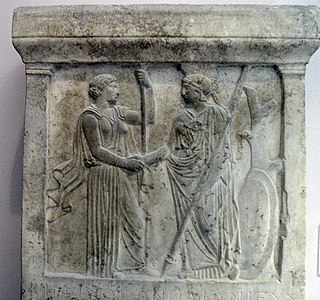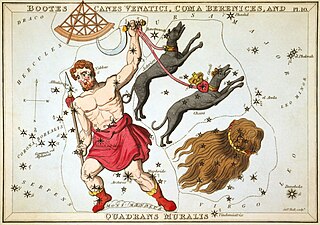Alexander Aetolus was a Greek poet and grammarian, the only known representative of Aetolian poetry.
Alexis was a Greek comic poet of the Middle Comedy period. He was born at Thurii in Magna Graecia and taken early to Athens, where he became a citizen, being enrolled in the deme Oion (Οἶον) and the tribe Leontides. It is thought he lived to the age of 106 and died on the stage while being crowned. According to the Suda, a 10th-century encyclopedia, Alexis was the paternal uncle of the dramatist Menander and wrote 245 comedies, of which only fragments now survive, including some 130 preserved titles.
Didymus Chalcenterus, was an Ancient Greek scholar and grammarian who flourished in the time of Cicero and Augustus.
Diphilus, of Sinope, was a poet of the new Attic comedy and a contemporary of Menander. He is frequently listed together with Menander and Philemon, considered the three greatest poets of New Comedy. He was victorious at least three times at the Lenaia, placing him third before Philemon and Menander. Although most of his plays were written and acted at Athens he died at Smyrna. His body was returned and buried in Athens.
Antimachus of Colophon, or of Claros, was a Greek poet and grammarian, who flourished about 400 BC.

Johann Albrecht Friedrich August Meineke, German classical scholar, was born at Soest in the Duchy of Westphalia. He was father-in-law to philologist Theodor Bergk.

Ulpian was a prominent Roman jurist of Tyrian ancestry. He was considered one of the great legal authorities of his time and was one of the five jurists upon whom decisions were to be based according to the Law of Citations of Valentinian III.

The Deipnosophistae is an early 3rd-century AD Greek work by the Greco-Egyptian author Athenaeus of Naucratis. It is a long work of literary, historical, and antiquarian references set in Rome at a series of banquets held by the protagonist Publius Livius Larensis for an assembly of grammarians, lexicographers, jurists, musicians, and hangers-on. It is sometimes called the oldest surviving cookbook.
Callistratus of Aphidnae was an Athenian orator and general in the 4th century BCE.
Polemon of Athens was a Stoic philosopher and geographer. Of Athenian citizenship, he was most widely known as Polemon of Athens, but he was born either in Ilium, Samos, or Sicyon, and was also known as Polemon of Ilium and Polemon Periegetes. He traveled throughout Greece and wrote about the places he visited. He also compiled a collection of the epigrams he saw on the monuments and votive offerings. None of these works survive, but many later writers quote from them.

Duris of Samos was a Greek historian and was at some period tyrant of Samos. Duris was the author of a narrative history of events in Greece and Macedonia from 371 BC to 281 BC, which has been lost. Other works included a life of Agathocles of Syracuse and a number of treatises on literary and artistic subjects.
Dionysius Chalcus was an ancient Athenian poet and orator. According to Athenaeus, he was called Chalcus ("brazen") because he advised the Athenians to adopt a brass coinage. His speeches have not survived, but his poems are referred to and quoted by such authors as Plutarch, Aristotle, and Athenaeus. The extant fragments are chiefly elegies on symposiac subjects and are characterized by extravagant metaphors.
Heraclides Lembus was an Ancient Greek statesman, historian and philosophical writer.
Alexander of Athens was a comic poet, the son of Aristion, whose name occurs in an inscription given in Böckh, who refers it to the 145th Olympiad in 200 BC. There seems also to have been a poet of the same name who was a writer of the Middle Comedy, quoted by the Scholiast on Homer, and Aristophanes and Athenaeus.
Androsthenes of Thasos, son of Callistratus, was one of the admirals of Alexander the Great. He sailed as a trierarch with Nearchus, and was also sent by Alexander down the Euphrates to explore the coast of the Persian Gulf, skirting the coast of Arabia in a triacontor and sailing farther than Archias of Pella. He wrote an account of this voyage, titled The Navigation of the Indian sea.

The Astronomia or Astrologia is a fragmentary Ancient Greek hexameter poem that was attributed to Hesiod during antiquity. As the title of the poem suggests, it was astronomical in focus, dealing with the stars. It has been suspected that the Astronomia influenced the style of Aratus' Phaenomena, but the remains of the Hesiodic poem found in ancient quotations are too meager to allow for certainty on this matter.

The Aegimius is a fragmentary Ancient Greek epic poem that was variously attributed to Hesiod or Cercops of Miletus during antiquity. The "Aegimius" of the title was surely the son of Dorus, but the surviving fragments have nothing to do directly with this figure, and, despite his status as title character, it cannot be inferred from the available evidence that the poem was primarily concerned with the Dorian king. Instead other myths, such as those concerning Io, Theseus, and the golden fleece, are found among the handful of fragments preserved in other ancient authors as quotations and paraphrases.
Ananius was a Greek iambic poet, contemporary with Hipponax. The invention of the satyric iambic verse called Scazon is ascribed to him as well as to Hipponax. Some fragments of Ananius are preserved by Athenaeus, and all that is known of him was collected by Friedrich Gottlieb Welcker in the 19th century.







